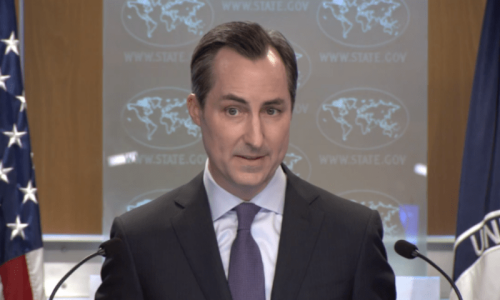IT is August 2021. Pakistani spymasters, pro-establishment ideologues and then prime minister Imran Khan unanimously celebrate the re-conquest of Afghanistan by the Taliban. The age-old pursuit of a ‘friendly government’ in Kabul has been achieved.
Fast forward three years. The shadowy entity which goes by the name of the TTP is again present in Pakhtun tribal districts like Waziristan. The same TTP and its affiliates plan and perpetrate attacks in settled districts like Bannu and Dera Ismail Khan, in the former case directly targeting the army cantonment.
Many innocents perish, as Islamabad issues recriminations against the ‘friendly government’ in Kabul. The security establishment warns it will respond with indiscriminate military operations to crush ‘terrorism’, without explaining why innumerable operations in the past didn’t cut off what appears to be a never-ending supply of ‘terrorists’.
The train of events is both predictable and tragic. Long before the last American troops left Afghanistan, progressive voices in Pakistan — both Pakhtun and others — had warned against hailing the change of guard as some kind of anti-imperialist triumph. Many also foresaw that Islamabad’s backing of the so-called Afghan Taliban 2.0 regime would inevitably translate into rejuvenated religious militancy in the Pakhtun border districts.
The least we can do is speak up for the masses.
If the people of KP and Balochistan are again paying the price of the establishment’s delusions of grandeur, they, along with millions of ordinary Afghans, are also set up to be guinea pigs in a fresh wave of geopolitical sparring involving many regional and global actors.
Recall that, under the terms of the so-called Doha peace deal inked in February 2020, the US willingly handed Afghanistan back to the Taliban. Domestic political imperatives meant that the Pentagon could no longer justify extending what was already the longest war in US history. So, Washington decided to pursue its interests in Afghanistan and the wider region through other, familiar, means.
Even without troops on the ground, the US will resist China’s growing influence over the Taliban government, evidenced by Beijing’s offer to include Afghanistan in the billion-dollar Belt & Road Initiative. Then there are the Gulf kingdoms, Saudi Arabia in the lead, seeking to extend their expanding economic and geopolitical footprint in the region building on their historical ties with the Taliban. Finally, there is Afghanistan’s immediate neighbour to the west, Iran, whose oil resources and enmity with both Washington and the Taliban also make it a party to the latest iteration of the Great Game.
The Great Game is, of course, the epithet for the strategic rivalry that played out from the 19th century onwards between the then British and Russian empires for control over Afghanistan, Persia and the wider central Asia region. A variety of hot and cold wars between the so-called Great Powers extended into the 20th century, intensifying after World War II, when the US empire sought to contain communist USSR and China.
Turkey and Pakistan were cultivated as garrison states on the front line of this war against communism, as was Iran, until the Shah was deposed in the late 1970s. But the biggest and most brutal confrontation played out in Afghanistan from 1977 onwards under the guise of the anti-Soviet ‘jihad’ against the left-wing PDPA government. Funded by Saudi Arabia and the US, and prosecuted by Pakistan, the legacy of this disastrous policy is now playing out for the umpteenth time.
Orientalist narratives in the West and racism in mainland Pakistan caricature Pakh-tuns on both sides of the Durand Line as religious fanatics wedded to prehistoric, un-civilised mores. This provides the justification to brand them ‘terrorists’ to be wiped out. Even though militancy in Baloch areas is largely secular in nature, a similar totalising narrative is deployed to dehumanise the Baloch people too. Little has changed in Pakistani and imperialist statecraft since the carrot and stick days of the British Raj.
Pro-establishment types will never tell us why there is no peace despite the ‘friendly government’ in Kabul. On the other hand are those who still think that the US invasion of Afghanistan was a godsend and refuse to acknowledge both the historical crimes of US imperialism and its continuing complicity in the cold wars of today. And then there are the voices who think China is to be supported at all costs because it ostensibly opposes US hegemony, regardless of what that means for the Pakhtun, Baloch and other masses across the region.
The least we can do is speak up for the nameless masses paying a bloody price for the strategic games waged by unaccountable states. That is the bare minimum requirement for liberation from imperialism, shadowy spymasters and the Taliban.
The writer teaches at Quaid-i-Azam University, Islamabad.
Published in Dawn, July 19th, 2024













































Dear visitor, the comments section is undergoing an overhaul and will return soon.